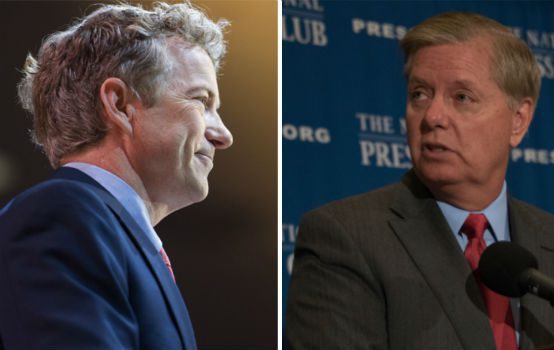The Proxy War Over Trump’s Foreign Policy

Six years ago, Republican Senators Rand Paul and Lindsey Graham had a “crazy bastard” fight over foreign policy and civil liberties. Politico reported three years later that the entire purpose of Graham’s 2016 presidential run was to “take down Rand Paul.” In June, Jim Antle explored how “Rand Paul and Lindsey Graham battle for clout with Trump.”
This war between libertarian realist Paul and uber-hawk Graham is not new.
And it continued on Tuesday in a Daily Beast story on how Bob Woodward’s new book about the inner workings of the Trump administration illustrates just how much Graham has tried to bend the president’s ear on foreign policy.
What foreign policy ideas does Graham have in mind for Trump? Assassinating North Korean dictator Kim Jong-un, for one. It is well known that Graham wants regime change in Iran and Syria. When urging the president to keep U.S. troops in Afghanistan indefinitely, he said to Trump, according to Woodward, “Do you want on your résumé that you allowed Afghanistan to go back into the darkness and the second 9/11 came from the very place the first 9/11 did?”
“Well, how does this end?” Trump reportedly asked him. “It never ends,” Graham said, adding, “It’s good versus evil. Good versus evil never ends.”
To Graham’s credit, he was at least upfront about subscribing to the familiar neoconservative formula for perpetual war.
Yet to our knowledge, Trump has not tried to coordinate with China to assassinate North Korea’s leader, and seems to have resisted those within his administration who have urged regime change in Iran and Syria.
I noted at TAC in August that Politico reported that Senator Rand Paul was key in convincing Trump that regime change in Iran is not only bad for America’s national security interests, but could start another Middle East war. The Daily Beast reports that Woodward has now revealed even more about the Paul-Trump relationship and how it often works against the agenda of hawks like Graham.
“[I]f Graham has tried to wield his influence with Trump to pull the trigger on more foreign interventions, Paul has wished to influence Trump in the polar-opposite direction,” reports the Daily Beast. “Unfortunately for the hawkish Graham, it appears at least some of Paul’s ideas have rubbed off on the president.”
“In defending his approach to Russian President Vladimir Putin and other repressive leaders,” the Daily Beast continues, “Trump has in recent months expressed to those close to him a sympathy for Paul’s non-intervention streak, stressing how American politicians of both parties want to recklessly start ‘World War III,’ if only to stick it to Putin or Assad.”
And this is where it really gets interesting: “Trump has then, in the same breath, praised more dovish Republicans such as ‘Rand, [who] won’t let that happen,’ and will help keep America from slipping into another quagmire or major war, according to a source familiar with Trump’s private comments.”
“Rand won’t let that happen.” That’s a hell of a statement from the president. It suggests that even Trump believes the proper balance between war and peace, as it relates to his White House’s decisions, rests on his ongoing relationship with and counsel from the Kentucky senator.
It appears that while Graham is trying to convince Trump to start World War III, it is still Paul who is attempting to prevent it. It is also obvious that Trump’s instincts on this front, if not always his rhetoric or cabinet selections, are more in line with Paul than Graham.
This is no small matter.
The foreign policy dispute between Paul and Graham existed long before anyone even considered Donald Trump a serious political contender, and it existed for a reason. The small but heretofore nonexistent libertarian wing of the GOP led by Paul represented the most significant challenge to the neoconservative foreign policy orthodoxy within the party that had reigned since the George W. Bush administration.
When Graham decided to run for president in 2016 to “take down Rand Paul,” it was not because GOP hawks necessarily believed Paul was winning the foreign policy argument—it was to prevent the argument from happening. Conservatives are hawks and liberals are doves, period, insists the calcified GOP establishment, as if the anti-war Pat Buchanan movement of the 1990s never happened, noninterventionism-friendly publications like TAC don’t exist, and staunch advocates of a restrained foreign policy like Russell Kirk—the man responsible for American rightists calling themselves “conservative” in the first place—weren’t relevant. In fact, almost the entire political history of the Paul family has been one of establishment Republicans insisting that both Ron Paul and Rand Paul are somehow GOP interlopers because they deviate from how dangerous men like Lindsey Graham think about foreign policy.
But as the Tea Party movement took shape in 2009 and 2010, inspiring many to question the exorbitant cost of federal budgets—including Pentagon budgets—and majorities of conservatives opposed President Barack Obama’s interventions in Libya and Syria, opportunities arose for Paul’s foreign policy to get a fairer hearing on the right.
Today, under Trump, those realist and noninterventionist views are not only receiving more attention than anyone would have expected just a few years ago, but the libertarian Paul appears to be resonating with the president more than the frozen-in-2003 Graham—much to hawks’ chagrin.
This is not to say that Trump will remain on this path. As Pat Buchanan noted Tuesday, the president is in danger of going “full neocon” regarding Syria—something Graham would undoubtedly approve of.
Still, “We would be at war with half the world if Lindsey had it his way,” according to one unidentified congressional aide quoted in the Daily Beast story. That we are not suggests Paul is winning this proxy war—whether Lindsey Graham and the old guard like it or not.
Jack Hunter is the former political editor of Rare.us and co-authored the 2011 book The Tea Party Goes to Washington with Senator Rand Paul.
Comments